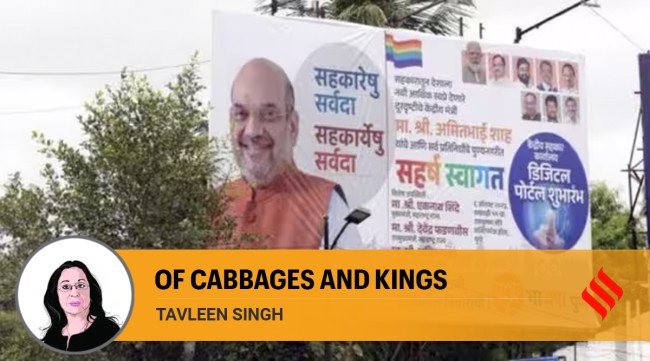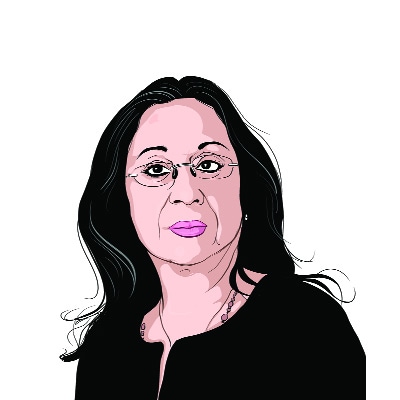Opinion Tavleen Singh writes: We have much to learn about democracy from countries who we believe learned from us
Manipur has been burning for nearly six months now, and you can count on the fingers of one hand the number of journalists who have gone there to report what is really happening.
 This offered the chance to gaze upon the omnipresent face of our Home Minister as it smiled out of posters pasted on walls and electric poles. (Representational Photo)
This offered the chance to gaze upon the omnipresent face of our Home Minister as it smiled out of posters pasted on walls and electric poles. (Representational Photo)
This column is being written hours after landing in the ‘mother of democracy’ from the most powerful democratic country in the world. I am obliged to travel to New York at least once a year to see my exiled son and every time I return from there, I am startled by how little we in India really know about democracy.
This struck me strongly this time. I landed in Mumbai on the last day of the Ganesh festival and was obliged to wait in endless traffic jams as Ganapati was bid farewell with flashing lights, music, and dancing. This offered the chance to gaze upon the omnipresent face of our Home Minister as it smiled out of posters pasted on walls and electric poles.
It occurred to me that in the ten days I spent in the United States, I did not see a single poster of a politician. In real democracies, politicians are not shown adulation of this kind. Nor are they treated like gods in the way that we treat them in this ‘mother of democracy’. They are held responsible for all things that go wrong and remain under constant scrutiny. Most of this scrutiny comes from the media. As someone who has worked in the media for decades, it shames me to admit that in India the media is no longer performing this role.
It is true that it has been emasculated by a government that takes crippling action against those who dare to ask questions, but it is also true that some of my comrades have willingly become government spokespersons. A weird mixture of belligerent nationalism and cringing sycophancy have reduced good journalists to cheerleaders.
Manipur has been burning for nearly six months now, and you can count on the fingers of one hand the number of journalists who have gone there to report what is really happening. There was a time when ethnic violence was reported by reporters who travelled to where it happened to become eyewitnesses for that first draft of history that journalism is meant to be. This no longer happens.
While in New York, I spent a whole morning watching the Attorney General, Merrick Garland, being interrogated by a House Judiciary Committee, in which Republican Congressmen charged him with unfairly targeting Donald Trump. He stood his ground and said he would not be intimidated, but the tone in which they asked their questions reminded me that this would never happen in our own ancient democracy. Which brings us to the role Parliament has played in recent years.
It is true that it is primarily the responsibility of the government to ensure that it functions properly, but the opposition is much to blame for constantly disrupting every session. Instead of storming out of the house and protesting under Gandhiji’s statue in the garden, they would have done better to register their dissidence inside the house. It is because they did not do this that the government has managed to pass laws simply by using its brute majority as a sledgehammer.
It is because the media and our legislators have both failed to raise real issues that the government has got away with setting precedents that are truly dangerous for democracy. The rule of law is essential in democracies. Today it is routinely disrespected by BJP chief ministers who demolish the homes of people they label as criminals without feeling the need to prove this in a court of law. Meanwhile, the man seen as the main challenger to Narendra Modi is to be seen these days learning about the lives of coolies, carpenters, mechanics, and truck drivers. It certainly shows that he has an enhanced idea of noblesse oblige, but it also shows that he is not doing his real job.
Sycophancy has been a ubiquitous element in Indian politics since that time when a Congress President declared that ‘Indira is India and India is Indira’, but it has lately got completely out of hand. I cannot remember the last time that a minister of the Government of India made a speech in which he did not say that it was the ‘visionary’ leadership of Narendra Modi that had made it possible for him to do whatever he was doing. It seems that none of our politicians remember those ‘visionary’ words of Acharya Kripalani when the Emergency ended. He said at a public meeting outside the Red Fort that politicians had feet of clay and must never be treated as gods.
In this land officially declared as the ‘mother of democracy’ can we hope that some understanding of real democracy returns someday soon. We could begin by urging our politicians to stop defacing the walls of our cities with huge posters of their usually unattractive faces. In Mumbai, despite being home to Bollywood, there are more posters of politicians than movie stars, and at least movie stars are easy on the eye. We have much to learn about democracy from countries who we believe have learned about democracy from us.
If we are indeed the mother of democracy, we must urge our political leaders to stop behaving like potentates and kings, and more like real servants of the people. That is what they are supposed to be. It would be particularly wise for them to remember this now. Soon, these potentates and kings will have to answer in the court of the people.






